Unit 11 How was your school trip Period 2 Section A (Grammar Focus-3b)课件(共47张PPT)
文档属性
| 名称 | Unit 11 How was your school trip Period 2 Section A (Grammar Focus-3b)课件(共47张PPT) | 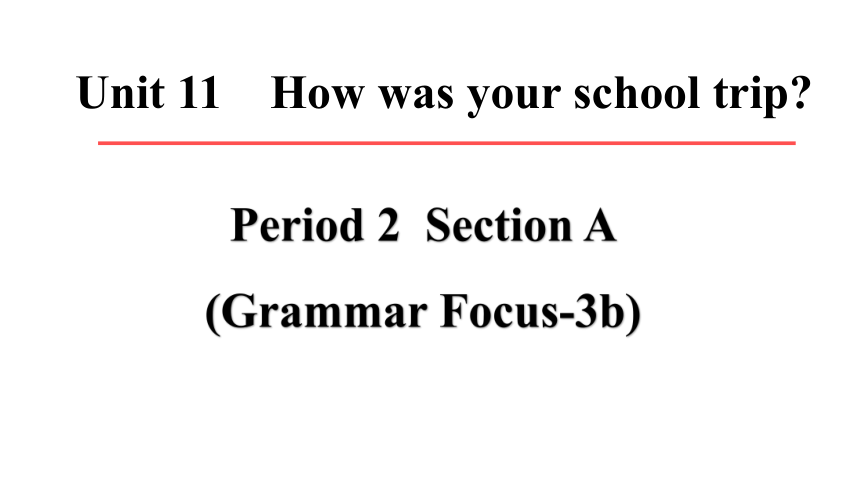 | |
| 格式 | pptx | ||
| 文件大小 | 12.0MB | ||
| 资源类型 | 教案 | ||
| 版本资源 | 人教新目标(Go for it)版 | ||
| 科目 | 英语 | ||
| 更新时间 | 2023-12-17 08:52:21 | ||
图片预览


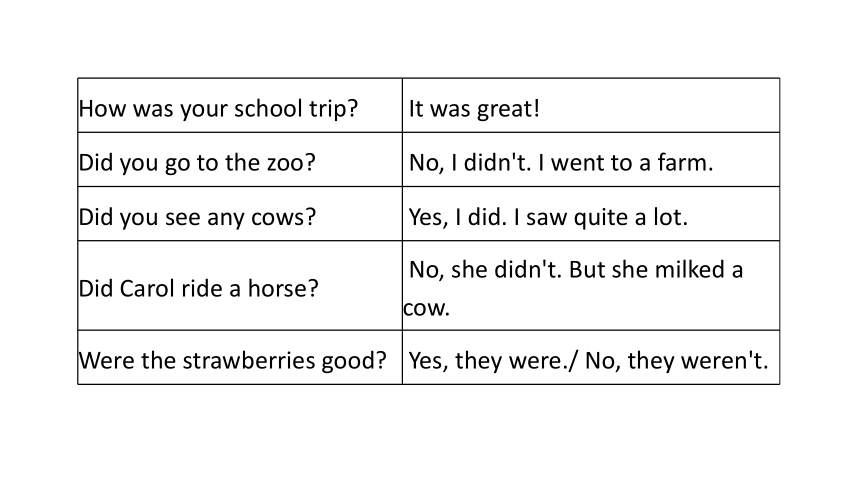
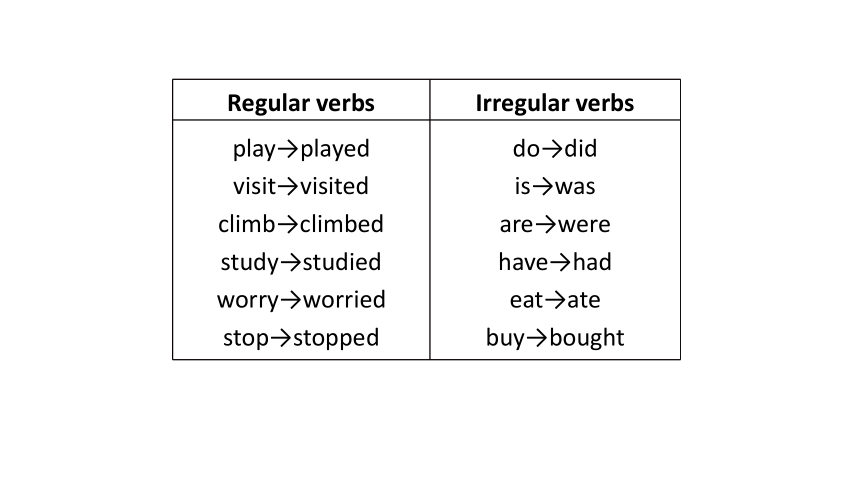
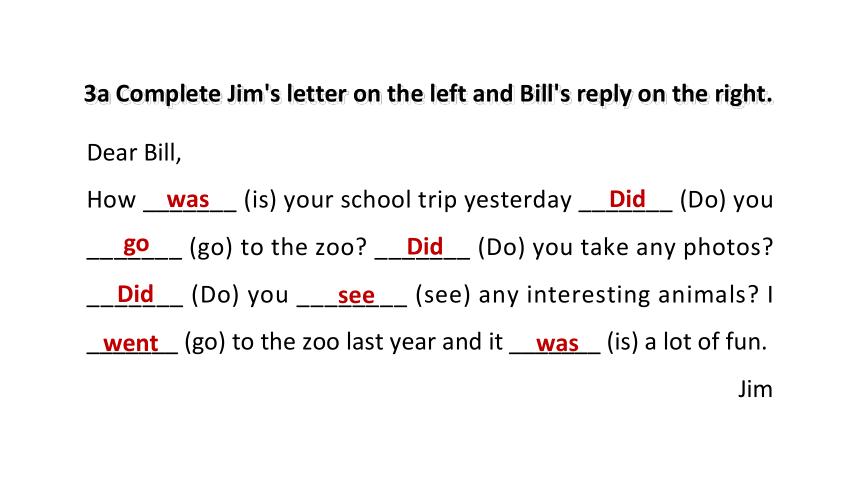
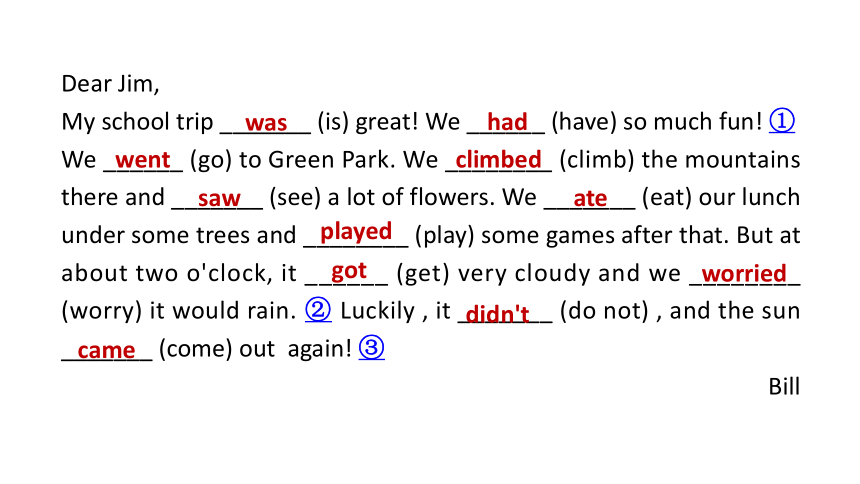
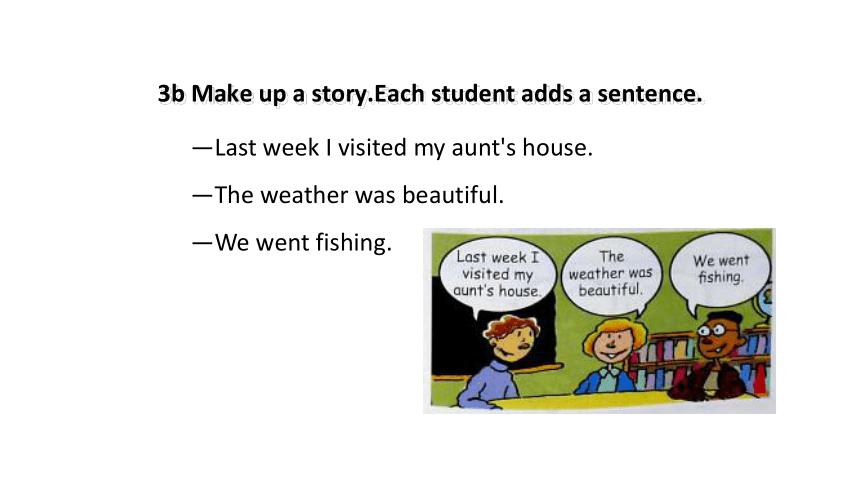
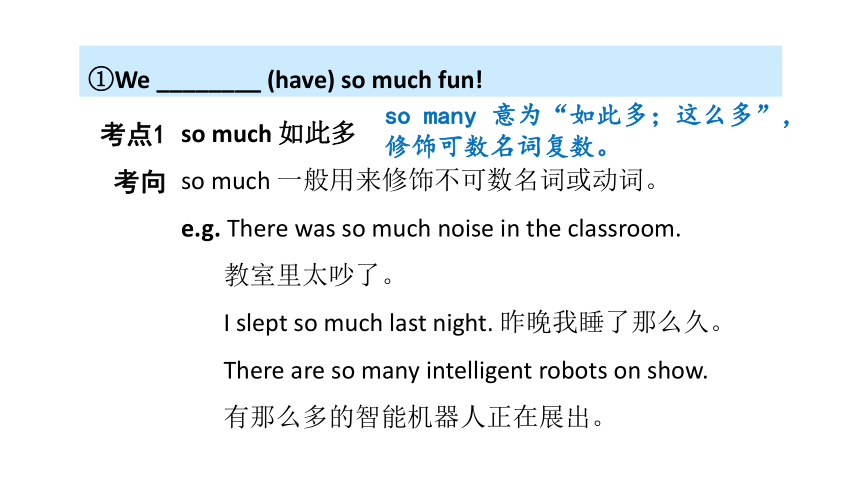
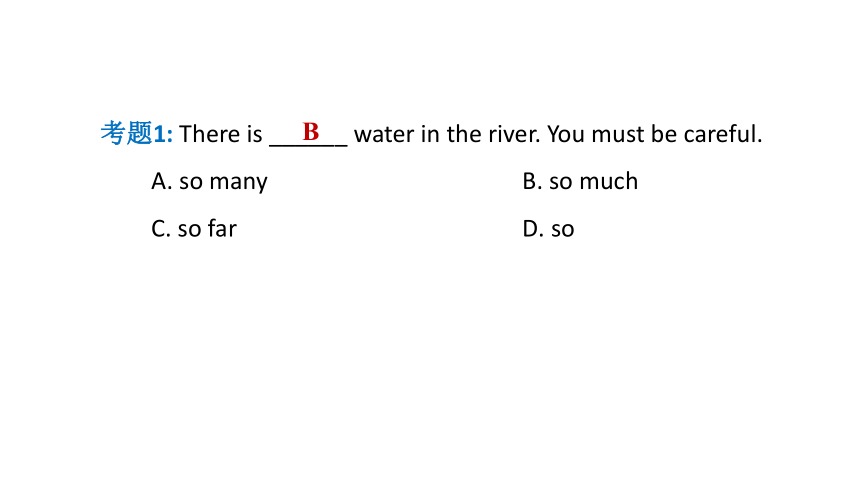
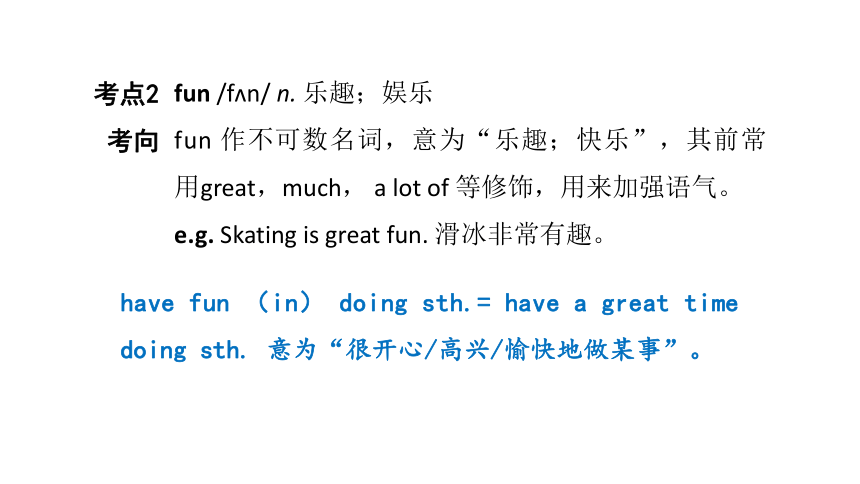
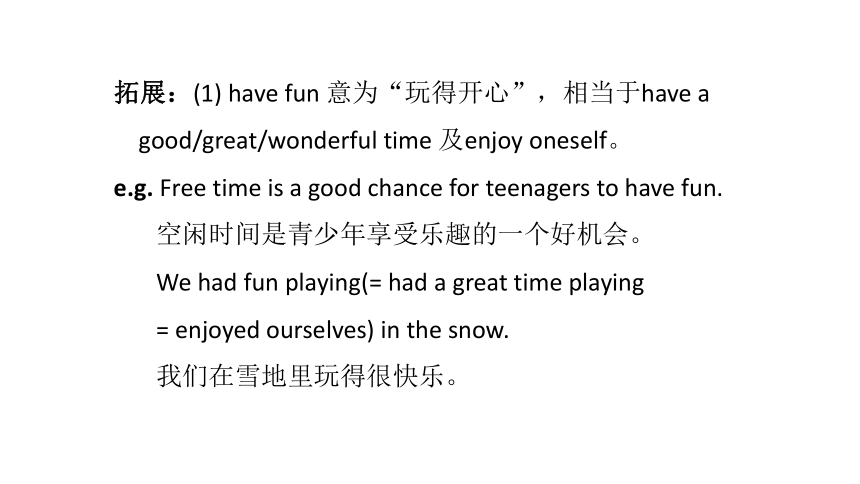
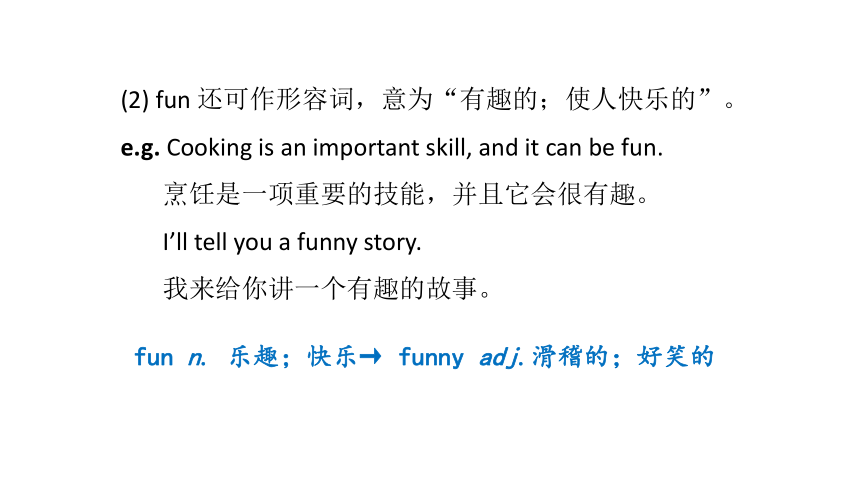
文档简介
(共47张PPT)
Period 2 Section A
(Grammar Focus-3b)
Unit 11 How was your school trip
Talk about the picture.
What can you see in the picture
How was your school trip It was great!
Did you go to the zoo No, I didn't. I went to a farm.
Did you see any cows Yes, I did. I saw quite a lot.
Did Carol ride a horse No, she didn't. But she milked a cow.
Were the strawberries good Yes, they were./ No, they weren't.
Regular verbs Irregular verbs
play→played visit→visited climb→climbed study→studied worry→worried stop→stopped do→did
is→was
are→were
have→had
eat→ate
buy→bought
Dear Bill,
How _______ (is) your school trip yesterday _______ (Do) you _______ (go) to the zoo _______ (Do) you take any photos _______ (Do) you ________ (see) any interesting animals I _______ (go) to the zoo last year and it _______ (is) a lot of fun.
Jim
3a Complete Jim's letter on the left and Bill's reply on the right.
was
Did
go
Did
Did
see
went
was
Dear Jim,
My school trip _______ (is) great! We ______ (have) so much fun! ① We ______ (go) to Green Park. We ________ (climb) the mountains there and _______ (see) a lot of flowers. We _______ (eat) our lunch under some trees and ________ (play) some games after that. But at about two o'clock, it ______ (get) very cloudy and we ________ (worry) it would rain. ② Luckily , it _______ (do not) , and the sun _______ (come) out again! ③
Bill
was
had
went
climbed
saw
ate
played
got
worried
didn't
came
3b Make up a story.Each student adds a sentence.
—Last week I visited my aunt's house.
—The weather was beautiful.
—We went fishing.
①We ________ (have) so much fun!
so much 如此多
so much 一般用来修饰不可数名词或动词。
e.g. There was so much noise in the classroom.
教室里太吵了。
I slept so much last night. 昨晚我睡了那么久。
There are so many intelligent robots on show.
有那么多的智能机器人正在展出。
考点1
考向
so many 意为“如此多;这么多”,修饰可数名词复数。
考题1: There is ______ water in the river. You must be careful.
A. so many B. so much
C. so far D. so
B
have fun (in) doing sth.= have a great time doing sth. 意为“很开心/高兴/愉快地做某事”。
fun /f n/ n. 乐趣;娱乐
fun 作不可数名词,意为“乐趣;快乐”,其前常用great,much, a lot of 等修饰,用来加强语气。
e.g. Skating is great fun. 滑冰非常有趣。
考点2
考向
拓展:(1) have fun 意为“玩得开心”,相当于have a good/great/wonderful time 及enjoy oneself。
e.g. Free time is a good chance for teenagers to have fun.
空闲时间是青少年享受乐趣的一个好机会。
We had fun playing(= had a great time playing
= enjoyed ourselves) in the snow.
我们在雪地里玩得很快乐。
(2) fun 还可作形容词,意为“有趣的;使人快乐的”。
e.g. Cooking is an important skill, and it can be fun.
烹饪是一项重要的技能,并且它会很有趣。
I’ll tell you a funny story.
我来给你讲一个有趣的故事。
fun n. 乐趣;快乐→ funny adj.滑稽的;好笑的
考题2: They had a great time at the party last night.
(改为同义句)
They _______ _______ _______ at the party last night.
had much fun
返回
②But at about two o’clock, it _______ (get) very cloudy and we _______ (worry) it would rain.
worry /'w ri/, /'w ri/ v.& n. 担心;担忧
worry 作动词,意为“担心;担忧”。
e.g. I always worried that I couldn’t pass the exam.
我总是担心我不能通过考试。
Nothing worries me. 没有什么事使我担心。
Don’t worry about his grades. 不要担心他的成绩。
考点3
考向1
worry 作不可数名词,意为“忧虑;担心”;作可数名词,意为“令人担忧的事”。
e.g. No one wants to have worry. 没有人想有烦恼。
She is full of worries. 她有种种烦恼。
考向2
worry 作动词时的常见用法:
① worry + that 从句 担心/担忧……
② worry + sb. 使某人担心;使某人发愁
③ worry about... 担心……;忧虑……
worry 的词形变化:
worried adj. 担心的;担忧的(主语多为sb.)
be worried about... 担心……
worrying adj. 令人担忧的 (主语多为sth.)
考题3: [枣庄] 不要担心未来,开启你的新旅程吧。
Don’t _______ _______ tomorrow. Set out on your new journey.
考题4:[天津] — Oh, no! My mobile phone is missing!
—_______. Go to the lost and found office. They might have it.
A. Don’t worry B. Thanks a lot
C. It sounds great D. That’s cool
返回
别担心 非常感谢
听起来不错 太酷了
worry about
A
③Luckily, it _____ (do not) , and the sun _____(come) out again!
luckily /'l k li/ adv. 幸运地;好运地
e.g. Luckily, we got on the bus in time.
幸运的是,我们及时上了公共汽车。
考点4
luckily 通常放在句首,修饰整个句子。
luck 的词形变化:
luck n.
运气
unlucky adj. 不幸的
lucky adj. 幸运的
luckily adv. 幸运地
unluckily adv. 不幸地
反义词
反义词
拓展:(1) a lucky dog 幸运儿
e.g. —He won the lottery again. 他的彩票又中奖了。
—What a lucky dog! 真是个幸运儿!
(2) Lucky you!“你真幸运!”。非正式口语,相当于“You’re so lucky!”。you 还可改为me,him 等。
e.g. —I arrived home before the heavy rain. 我在大雨前回到了家。
—Lucky you !你真幸运!
考题5: [牡丹江] ______________(幸运地), my uncle became a passenger of the maiden flight(首航)of the C919.
【点拨】句意:幸运的是,我叔叔成为了C919 首飞的乘客。luckily“幸运地”,是副词,修饰整句。
Luckily
come out 出现
come out 意为“(太阳、月亮、星辰)出现”,是不及物动词短语,后不接宾语。
e.g. The sun is coming out. 太阳就要出来了。
考点5
考向
come 的相关短语:
come on 快点 come true 实现 come back 回来
come from 来自 come over 顺便拜访
拓展:come out 的其他常见含义:
come out (花)盛开;开花
e.g. The flowers come out in spring. 花儿在春天开放。
出版;发表
e. g. My new novel will come out this month.
我的新小说将于这个月出版。
(消息、真相等)被获知;为人所知
e. g. When the news came out, everyone was surprised.
消息传来,每个人都很惊讶。
返回
考题6: —I can’t see anything in your garden, Grandpa.
—But in spring, the flowers all ______.
A. come over B. come in
C. come on D. come out
【点拨】come over 过来;come in 进来;come on加油;come out 盛开。根据句意可知花朵在春天会盛开,可知答案选D。
D
一般过去时
基本 用法 一般过去时表示过去某个时间发生的动作或存在的状态,也表示过去经常或反复发生的动作。
(易错点)常与表示过去时间的词汇连用,如yesterday, the day before yesterday(前天),last night/week, three days ago, just now( 刚才),a moment ago(刚刚),in 2012 等。①
(易错点)表示过去经常或反复发生的动作时,常和often, always 等表示频率的副词连用。②
构 成 含有be 动词的一般过去时的构成 肯定句:主语+ was/were + 其他. ③
否定句:主语+ was/were + not + 其他. ④
一般疑问句:Was/Were + 主语+ 其他?
肯定回答:Yes, 主语+ was/were.
否定回答:No, 主语+ wasn’t/weren’t. ⑤
特殊疑问句:疑问词+ was/were(+主语)+ 其他?⑥
构 成 含有实义动词的一般过去时的构成 肯定句:主语+ 动词过去式+ 其他. ⑦
否定句:主语+ didn’t + 动词原形+ 其他. ⑧
一般疑问句:Did + 主语+ 动词原形+ 其他?
肯定回答:Yes, 主语+ did.
否定回答:No, 主语+ didn’t. ⑨
特殊疑问句:疑问词+ did + 主语+ 动词原形+其他?⑩
动词过去式的变化 1 e.g. I visited the Slender West Lake three days ago.
三天前我游览了瘦西湖。
They went to eat Zibo Barbecue last week.
上周他们去吃了淄博烧烤。
We became middle school students in 2022.
2022 年我们成了中学生。
考题1: [广西] Yesterday I _______ basketball with my classmates. We had a good time.
A. will play B. play C. played
【点拨】根据“Yesterday”可知,时态是一般过去时。
C
返回
2 e.g. He often went fishing last month.
上个月他经常去钓鱼。
He always caught fish in the small river when he was young.
他小时候常去小河里抓鱼。
特别提醒:am/is was; are were。
考题2: [武汉改编] Jessica always _______ every night before her Chinese test and got good results.
A. studies B. studied
C. has studied D. will study
【点拨】根据and 以及got 可知,空处与got 是并列关系,所以空处填动词过去式。
B
返回
3 e.g. Their party was very great yesterday.
昨天他们的派对非常棒。
When they set out they were well prepared.
他们出发时有很充分的准备。
4 e.g. I was not prepared for all the problems it caused.
我对这事引起的诸多麻烦毫无防备。
The students weren’t at school just now.
刚才学生们不在学校。
返回
5 e.g. —Were you at home last night
昨天晚上你在家吗?
—Yes, I was./No, I wasn’t.
是的, 我在家。/ 不, 我不在家。
返回
6 e.g. How was your vacation 你的假期怎么样?
特别提醒:在一般过去时的疑问句中,助动词did 后面的动词要用原形。
考题3: [天水] There ________ (be) a lot of rain outside last night.
【点拨】用语法分析法。由时间状语last night 可知,句子用一般过去时;rain 是不可数名词,be 动词用单数。
was
考题4: That actor was a farmer before. (改为否定句)
That actor _________ a farmer before.
wasn’t
返回
7 e.g. They listened to music just now.
刚才他们听音乐了。
8 e.g. They didn’t listen to music just now.
刚才他们没听音乐。
9 e.g. — Did they listen to music just now
刚才他们听音乐了吗?
— Yes, they did./No, they didn’t.
是的,他们听了。/ 不,他们没听。
返回
10 e.g. What did they listen to just now 他们刚刚在听什么?
考题5: [新疆] I learned paper cutting from my teacher.
(改为一般疑问句)
_________ you _________ paper cutting from your teacher
【点拨】原句含有实义动词learned,时态是一般过去时,所以变一般疑问句时助动词用did,放在主语前,后跟动词原形。
Did learn
考题6: [重庆A 卷] I talked to him on the phone yesterday.
(改为否定句)
I ________ ________ to him on the phone yesterday.
didn’t talk
考题7: [绥化] — How did you get to school yesterday
—I _______ my bike to school.
A. rode B. ride C. rides
A
返回
11 动词过去式的变化规则
规则动词过去式的构成
考点1
构成规则 原形 过去式
一般在动词原形末尾加-ed clean play visit cleaned
played
visited
以e 结尾的动词在词尾加-d live practice change lived
practiced
changed
构成规则 原形 过去式
以重读闭音节结尾的动词, 末尾只有一个辅音字母时, 先双写这个辅音字母, 再加-ed stop plan stopped
planned
结尾是“辅音字母+y”的动词, 先变y 为i, 再加-ed study carry studied
carried
考题8: [兰州] We had a school trip last month and I _________ (enjoy) every minute of it.
【点拨】根据“last month”可知时态是一般过去时,空处用过去式。
enjoyed
不规则变化
不规则变化的动词需要参照课本第141 页附表特殊记忆。
考点2
考题9: [包头] Over 180 North American teenagers __________ (take) part in a “cloud dialogue”, learning about the Sanxingdui Ruins in China several weeks ago.
【点拨】根据“several weeks ago”可知句子应用一般过去时,谓语应用动词take 的过去式took。
took
返回
本节课主要听写了单词, 学习了语法: ①一般过去时 ②用How提问含一般过去时的句子 ③一般过去时的一般疑问句及其答语 ④动词过去式的变化; 掌握了知识点so much fun, worry, luckily和come out的用法, 并做了相应的练习加以巩固。
Period 2 Section A
(Grammar Focus-3b)
Unit 11 How was your school trip
Talk about the picture.
What can you see in the picture
How was your school trip It was great!
Did you go to the zoo No, I didn't. I went to a farm.
Did you see any cows Yes, I did. I saw quite a lot.
Did Carol ride a horse No, she didn't. But she milked a cow.
Were the strawberries good Yes, they were./ No, they weren't.
Regular verbs Irregular verbs
play→played visit→visited climb→climbed study→studied worry→worried stop→stopped do→did
is→was
are→were
have→had
eat→ate
buy→bought
Dear Bill,
How _______ (is) your school trip yesterday _______ (Do) you _______ (go) to the zoo _______ (Do) you take any photos _______ (Do) you ________ (see) any interesting animals I _______ (go) to the zoo last year and it _______ (is) a lot of fun.
Jim
3a Complete Jim's letter on the left and Bill's reply on the right.
was
Did
go
Did
Did
see
went
was
Dear Jim,
My school trip _______ (is) great! We ______ (have) so much fun! ① We ______ (go) to Green Park. We ________ (climb) the mountains there and _______ (see) a lot of flowers. We _______ (eat) our lunch under some trees and ________ (play) some games after that. But at about two o'clock, it ______ (get) very cloudy and we ________ (worry) it would rain. ② Luckily , it _______ (do not) , and the sun _______ (come) out again! ③
Bill
was
had
went
climbed
saw
ate
played
got
worried
didn't
came
3b Make up a story.Each student adds a sentence.
—Last week I visited my aunt's house.
—The weather was beautiful.
—We went fishing.
①We ________ (have) so much fun!
so much 如此多
so much 一般用来修饰不可数名词或动词。
e.g. There was so much noise in the classroom.
教室里太吵了。
I slept so much last night. 昨晚我睡了那么久。
There are so many intelligent robots on show.
有那么多的智能机器人正在展出。
考点1
考向
so many 意为“如此多;这么多”,修饰可数名词复数。
考题1: There is ______ water in the river. You must be careful.
A. so many B. so much
C. so far D. so
B
have fun (in) doing sth.= have a great time doing sth. 意为“很开心/高兴/愉快地做某事”。
fun /f n/ n. 乐趣;娱乐
fun 作不可数名词,意为“乐趣;快乐”,其前常用great,much, a lot of 等修饰,用来加强语气。
e.g. Skating is great fun. 滑冰非常有趣。
考点2
考向
拓展:(1) have fun 意为“玩得开心”,相当于have a good/great/wonderful time 及enjoy oneself。
e.g. Free time is a good chance for teenagers to have fun.
空闲时间是青少年享受乐趣的一个好机会。
We had fun playing(= had a great time playing
= enjoyed ourselves) in the snow.
我们在雪地里玩得很快乐。
(2) fun 还可作形容词,意为“有趣的;使人快乐的”。
e.g. Cooking is an important skill, and it can be fun.
烹饪是一项重要的技能,并且它会很有趣。
I’ll tell you a funny story.
我来给你讲一个有趣的故事。
fun n. 乐趣;快乐→ funny adj.滑稽的;好笑的
考题2: They had a great time at the party last night.
(改为同义句)
They _______ _______ _______ at the party last night.
had much fun
返回
②But at about two o’clock, it _______ (get) very cloudy and we _______ (worry) it would rain.
worry /'w ri/, /'w ri/ v.& n. 担心;担忧
worry 作动词,意为“担心;担忧”。
e.g. I always worried that I couldn’t pass the exam.
我总是担心我不能通过考试。
Nothing worries me. 没有什么事使我担心。
Don’t worry about his grades. 不要担心他的成绩。
考点3
考向1
worry 作不可数名词,意为“忧虑;担心”;作可数名词,意为“令人担忧的事”。
e.g. No one wants to have worry. 没有人想有烦恼。
She is full of worries. 她有种种烦恼。
考向2
worry 作动词时的常见用法:
① worry + that 从句 担心/担忧……
② worry + sb. 使某人担心;使某人发愁
③ worry about... 担心……;忧虑……
worry 的词形变化:
worried adj. 担心的;担忧的(主语多为sb.)
be worried about... 担心……
worrying adj. 令人担忧的 (主语多为sth.)
考题3: [枣庄] 不要担心未来,开启你的新旅程吧。
Don’t _______ _______ tomorrow. Set out on your new journey.
考题4:[天津] — Oh, no! My mobile phone is missing!
—_______. Go to the lost and found office. They might have it.
A. Don’t worry B. Thanks a lot
C. It sounds great D. That’s cool
返回
别担心 非常感谢
听起来不错 太酷了
worry about
A
③Luckily, it _____ (do not) , and the sun _____(come) out again!
luckily /'l k li/ adv. 幸运地;好运地
e.g. Luckily, we got on the bus in time.
幸运的是,我们及时上了公共汽车。
考点4
luckily 通常放在句首,修饰整个句子。
luck 的词形变化:
luck n.
运气
unlucky adj. 不幸的
lucky adj. 幸运的
luckily adv. 幸运地
unluckily adv. 不幸地
反义词
反义词
拓展:(1) a lucky dog 幸运儿
e.g. —He won the lottery again. 他的彩票又中奖了。
—What a lucky dog! 真是个幸运儿!
(2) Lucky you!“你真幸运!”。非正式口语,相当于“You’re so lucky!”。you 还可改为me,him 等。
e.g. —I arrived home before the heavy rain. 我在大雨前回到了家。
—Lucky you !你真幸运!
考题5: [牡丹江] ______________(幸运地), my uncle became a passenger of the maiden flight(首航)of the C919.
【点拨】句意:幸运的是,我叔叔成为了C919 首飞的乘客。luckily“幸运地”,是副词,修饰整句。
Luckily
come out 出现
come out 意为“(太阳、月亮、星辰)出现”,是不及物动词短语,后不接宾语。
e.g. The sun is coming out. 太阳就要出来了。
考点5
考向
come 的相关短语:
come on 快点 come true 实现 come back 回来
come from 来自 come over 顺便拜访
拓展:come out 的其他常见含义:
come out (花)盛开;开花
e.g. The flowers come out in spring. 花儿在春天开放。
出版;发表
e. g. My new novel will come out this month.
我的新小说将于这个月出版。
(消息、真相等)被获知;为人所知
e. g. When the news came out, everyone was surprised.
消息传来,每个人都很惊讶。
返回
考题6: —I can’t see anything in your garden, Grandpa.
—But in spring, the flowers all ______.
A. come over B. come in
C. come on D. come out
【点拨】come over 过来;come in 进来;come on加油;come out 盛开。根据句意可知花朵在春天会盛开,可知答案选D。
D
一般过去时
基本 用法 一般过去时表示过去某个时间发生的动作或存在的状态,也表示过去经常或反复发生的动作。
(易错点)常与表示过去时间的词汇连用,如yesterday, the day before yesterday(前天),last night/week, three days ago, just now( 刚才),a moment ago(刚刚),in 2012 等。①
(易错点)表示过去经常或反复发生的动作时,常和often, always 等表示频率的副词连用。②
构 成 含有be 动词的一般过去时的构成 肯定句:主语+ was/were + 其他. ③
否定句:主语+ was/were + not + 其他. ④
一般疑问句:Was/Were + 主语+ 其他?
肯定回答:Yes, 主语+ was/were.
否定回答:No, 主语+ wasn’t/weren’t. ⑤
特殊疑问句:疑问词+ was/were(+主语)+ 其他?⑥
构 成 含有实义动词的一般过去时的构成 肯定句:主语+ 动词过去式+ 其他. ⑦
否定句:主语+ didn’t + 动词原形+ 其他. ⑧
一般疑问句:Did + 主语+ 动词原形+ 其他?
肯定回答:Yes, 主语+ did.
否定回答:No, 主语+ didn’t. ⑨
特殊疑问句:疑问词+ did + 主语+ 动词原形+其他?⑩
动词过去式的变化 1 e.g. I visited the Slender West Lake three days ago.
三天前我游览了瘦西湖。
They went to eat Zibo Barbecue last week.
上周他们去吃了淄博烧烤。
We became middle school students in 2022.
2022 年我们成了中学生。
考题1: [广西] Yesterday I _______ basketball with my classmates. We had a good time.
A. will play B. play C. played
【点拨】根据“Yesterday”可知,时态是一般过去时。
C
返回
2 e.g. He often went fishing last month.
上个月他经常去钓鱼。
He always caught fish in the small river when he was young.
他小时候常去小河里抓鱼。
特别提醒:am/is was; are were。
考题2: [武汉改编] Jessica always _______ every night before her Chinese test and got good results.
A. studies B. studied
C. has studied D. will study
【点拨】根据and 以及got 可知,空处与got 是并列关系,所以空处填动词过去式。
B
返回
3 e.g. Their party was very great yesterday.
昨天他们的派对非常棒。
When they set out they were well prepared.
他们出发时有很充分的准备。
4 e.g. I was not prepared for all the problems it caused.
我对这事引起的诸多麻烦毫无防备。
The students weren’t at school just now.
刚才学生们不在学校。
返回
5 e.g. —Were you at home last night
昨天晚上你在家吗?
—Yes, I was./No, I wasn’t.
是的, 我在家。/ 不, 我不在家。
返回
6 e.g. How was your vacation 你的假期怎么样?
特别提醒:在一般过去时的疑问句中,助动词did 后面的动词要用原形。
考题3: [天水] There ________ (be) a lot of rain outside last night.
【点拨】用语法分析法。由时间状语last night 可知,句子用一般过去时;rain 是不可数名词,be 动词用单数。
was
考题4: That actor was a farmer before. (改为否定句)
That actor _________ a farmer before.
wasn’t
返回
7 e.g. They listened to music just now.
刚才他们听音乐了。
8 e.g. They didn’t listen to music just now.
刚才他们没听音乐。
9 e.g. — Did they listen to music just now
刚才他们听音乐了吗?
— Yes, they did./No, they didn’t.
是的,他们听了。/ 不,他们没听。
返回
10 e.g. What did they listen to just now 他们刚刚在听什么?
考题5: [新疆] I learned paper cutting from my teacher.
(改为一般疑问句)
_________ you _________ paper cutting from your teacher
【点拨】原句含有实义动词learned,时态是一般过去时,所以变一般疑问句时助动词用did,放在主语前,后跟动词原形。
Did learn
考题6: [重庆A 卷] I talked to him on the phone yesterday.
(改为否定句)
I ________ ________ to him on the phone yesterday.
didn’t talk
考题7: [绥化] — How did you get to school yesterday
—I _______ my bike to school.
A. rode B. ride C. rides
A
返回
11 动词过去式的变化规则
规则动词过去式的构成
考点1
构成规则 原形 过去式
一般在动词原形末尾加-ed clean play visit cleaned
played
visited
以e 结尾的动词在词尾加-d live practice change lived
practiced
changed
构成规则 原形 过去式
以重读闭音节结尾的动词, 末尾只有一个辅音字母时, 先双写这个辅音字母, 再加-ed stop plan stopped
planned
结尾是“辅音字母+y”的动词, 先变y 为i, 再加-ed study carry studied
carried
考题8: [兰州] We had a school trip last month and I _________ (enjoy) every minute of it.
【点拨】根据“last month”可知时态是一般过去时,空处用过去式。
enjoyed
不规则变化
不规则变化的动词需要参照课本第141 页附表特殊记忆。
考点2
考题9: [包头] Over 180 North American teenagers __________ (take) part in a “cloud dialogue”, learning about the Sanxingdui Ruins in China several weeks ago.
【点拨】根据“several weeks ago”可知句子应用一般过去时,谓语应用动词take 的过去式took。
took
返回
本节课主要听写了单词, 学习了语法: ①一般过去时 ②用How提问含一般过去时的句子 ③一般过去时的一般疑问句及其答语 ④动词过去式的变化; 掌握了知识点so much fun, worry, luckily和come out的用法, 并做了相应的练习加以巩固。
同课章节目录
- Unit 1 Can you play the guitar?
- Section A
- Section B
- Unit 2 What time do you go to school?
- Section A
- Section B
- Unit 3 How do you get to school?
- Section A
- Section B
- Unit 4 Don't eat in class.
- Section A
- Section B
- Unit 5 Why do you like pandas?
- Section A
- Section B
- Unit 6 I'm watching TV.
- Section A
- Section B
- Review of Units 1-6
- Unit 7 It's raining!
- Section A
- Section B
- Unit 8 Is there a post office near here?
- Section A
- Section B
- Unit 9 What does he look like?
- Section A
- Section B
- Unit 10 I'd like some noodles.
- Section A
- Section B
- Unit 11 How was your school trip?
- Section A
- Section B
- Unit 12 What did you do last weekend?
- Section A
- Section B
